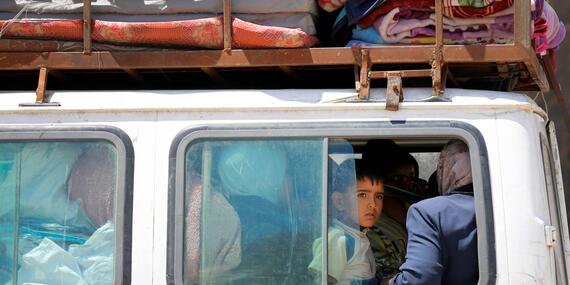Today's top news: Occupied Palestinian Territory, Hurricane Beryl, Sudan, Ukraine

Occupied Palestinian Territory
OCHA says tens of thousands of people have been displaced from eastern Khan Younis in Gaza following Israel’s latest evacuation order.
“We have seen a constant flow of people moving out,” OCHA’s Head of Office for the Occupied Palestinian Territory, Andrea De Domenico, told journalists during a briefing earlier today. Mr. De Domenico said the UN and humanitarian partners are having to reset their operations yet again in the wake of Monday’s evacuation order.
Yesterday, a team from OCHA and the World Health Organization visited the European Gaza Hospital, which now stands empty.
In a social media post, WHO’s Director-General Dr. Tedros Adhanom Ghebreyesus said all 320 patients and all medical personnel have evacuated the hospital. Most patients have been referred to Nasser Medical Complex – which is now at full capacity, with more than 350 inpatients. Medical supplies and drugs for surgery are in short supply.
OCHA has helped move medical equipment from the hospital and WHO plans to remove the remaining equipment as soon as possible.
Dr. Tedros said it is devastating to see the hospital – which had a capacity of 650 beds – out of service, at a time when access to health care is urgently needed.
He stressed that it must be protected and made operational immediately, underscoring that Gaza cannot afford to lose more hospitals.
And turning to the West Bank, OCHA reports that there have been 28 incidents of airstrikes there since 7 October – including two just last week. Fourteen children were among the 77 Palestinians killed during these airstrikes.
Meanwhile, OCHA says a UN-led assessment yesterday found that at least 200 homes were damaged during a recent operation by Israeli forces in the Nur Shams Refugee Camp in Tulkarm.
Hurricane Beryl
UN teams are in Saint Vincent and the Grenadines and Grenada after Hurricane Beryl battered the islands.
OCHA has staff working closely with the Caribbean Disaster Emergency Management Agency and joined the agency’s rapid assessment team in Saint Vincent and the Grenadines, arriving yesterday afternoon.
OCHA teams are in Barbados, supporting the Resident Coordinator for Barbados and the Eastern Caribbean, Simon Springett and our partners to respond to the hurricane’s impact on Grenada and St. Vincent and the Grenadines, where national authorities, UN agencies and partners are assessing the magnitude of the damage.
To date, Grenada and St. Vincent have reported that hundreds of people are in shelters.
We continue to monitor the path of Hurricane Beryl, which is moving west as a Category 4 storm and will likely reach Jamaica today and Belize and Mexico afterwards as a weaker, but still dangerous, hurricane.
OCHA is deploying a team to Belize ahead of the hurricane’s landfall, with a team heading to Jamaica after Beryl passes. OCHA is also preparing teams in Central America. Emergency response experts from the UN Disaster Assessment and Coordination teams are also being deployed to Barbados, Jamaica and potentially Belize.
Though our teams have been preparing months ahead of this hurricane season, such a strong storm this early in the season is extremely rare.
Sudan
OCHA is alarmed by the ongoing displacement of tens of thousands of people in and from Sudan's Sennar State in the southeast.
The clashes between the Sudanese Armed Forces and the Rapid Support Forces in the town of Sinja have been sudden and violent, forcing families to flee east toward the neighbouring state of Gedaref.
An OCHA team is in Gedaref and today visited a number of reception sites where displaced families are seeking shelter. Children and older people are among those arriving in very difficult conditions, having been unable to bring much with them.
OCHA is working with UN agencies and partners to provide critical humanitarian assistance, with our colleagues on the ground in Gedaref reporting that people continue to arrive in large numbers. The World Food Programme has prepositioned more than 2,200 metric tons of food to respond to the ongoing crisis.
OCHA is deeply concerned that the spreading conflict and rising insecurity could sever a key route for the transport of humanitarian assistance from Port Sudan in the east. With famine looming, it is imperative to sustain the delivery of life-saving aid across conflict lines and across borders.
We call on the parties to de-escalate immediately, spare civilians and ensure safe passage for those fleeing the fighting in Sinja and all conflict-affected areas in Sudan. They must have access to the humanitarian assistance they rely on.
Elsewhere in Sudan, UNICEF reports that at least eight children, including an 18-month-old, were killed in a reported drone attack on a mosque in Al Fasher, North Darfur, on Monday. Nine other children were injured. The mosque had been serving as a community kitchen, providing food to vulnerable children and their families. UNICEF underscores that the senseless killing of children in Sudan must end.
Ukraine
Ukraine's Dnipro City experienced an attack this morning.
This is the second deadly attack in less than a week on the fourth largest city in the country, which hosts 180,000 displaced people who fled hostilities in the east and south of the country.
According to authorities and humanitarian partners on the ground, 5 people were killed and 47 people were injured, including a child, in the attack today. Several hospitals, schools and a collective site where 120 displaced people reside were also damaged.
Humanitarian workers are already on site, complementing the efforts of first responders, providing psychological support and distributing materials to cover the damage.
Yesterday, the regions of Donetsk, Kharkiv and Kherson were also impacted by attacks that damaged homes and civilian infrastructure. More than 40 civilian casualties were reported, according to authorities and humanitarian partners on the ground.
Meanwhile, humanitarian organizations continue to support people across the country. Over the first five months, more than 5 million people received humanitarian assistance.
